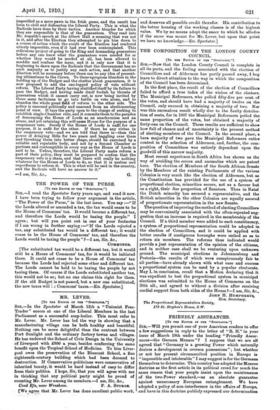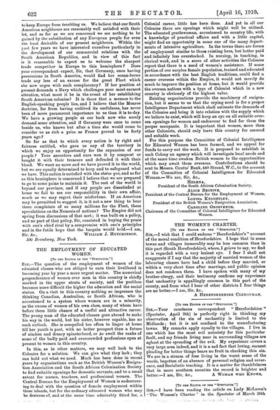FRIENDLY ASSURANCES.
[To THE EDITOR Or THE .SPECTATOR."]
Sra,—Will you permit one of your American readers to offer a few suggestions in reply to the letter of "R. H." in your issue of March 19th under the heading "Friendly Assur- ances—the German Menace " ? I suppose that we are all agreed that "Germany is a growing Power which naturally desires a development in oversea possessions "; but whether or not her present circumscribed position in Europe is " impossible and intolerable " I may suggest is for the Germans themselves to determine. This country has adopted the Monroe doctrine as the first article in its political creed for much the same reason that your people insist upon the maintenance of the two-Power standard,—as an absolute guarantee against unnecessary European entanglement. We have adopted a policy of non-interference in the affairs of Europe, and have in this doctrine publicly expressed our determination
to keep Europe from troubling us. We believe that our South American neighbours are reasonably well satisfied with their lot, and as far as we are concerned we see nothing to be gained by the substitution of any European people for even the least desirable of our present neighbours. Within the past few years we have interested ourselves particularly in the development of our commercial relations with the South American Republics, and in view of this fact is it reasonable to expect us to welcome the sharpest trade competitor in Europe to this hemisphere ? Does your correspondent expect, Sir, that Germany, once having possessions in South America, would find her ocean-borne trade any less of an excuse for the great Fleet which she now urges with such complacency ? If her position at present demands a Navy which challenges your most earnest attention, what must it be in the event of her establishing South American colonies ? It is there that a menace to the English-speaking people lies, and I believe that the Monroe doctrine, far from having outlived its usefulness, has never been of more paramount importance to us than it is to-day. We have a growing people at our back now who surely demand some attention, and if Germany were once to come beside us, who knows but after a time she would come to consider us as rich a prize as France proved to be forty years ago ?
So far as that to which every nation is by right and fairness entitled, who gave us any of the territory in which we enjoy an opportunity for the expansion of our people ? Your• ancestors and ours won it by conquest or bought it with their treasure and defended it with their blood. We want no more and we have proved it to the world, but we are equally determined to keep and to safeguard what we have. This nation is satisfied with the status quo, and so far• as this hemisphere is concerned I believe that we are prepared to go to some pains to maintain it. The rest of the world is beyond our province, and if any people are dissatisfied at home we fail to see our responsibility in their own affair, much as we may regret their misfortune. If an American may be permitted to suggest it, is it not a new thing to hear these complaints of so many millions for the Fleet, these speculations on the Nemesis of nations ? The Empire did not spring from discussions of that sort ; it was built on a policy, and no part of that policy, Sir, consisted in buying the peace with one's chief rival by a compromise with one's principles and in the futile hope that the bargain would hold.—I am,















































 Previous page
Previous page